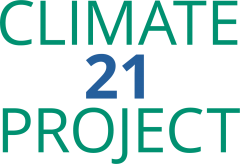Climate 21 Project Offers President-Elect Advice for 'Whole-of-Government' Approach to Climate Change

President-elect Joe Biden has signaled that he wants to move quickly on a whole-of-government approach to step up the United States’ efforts in the fight against climate change. A project facilitated by Duke University’s Nicholas Institute for Environmental Policy Solutions lays out a path for the incoming administration to take that kind of urgent and meaningful action across the federal government starting on Inauguration Day.
Developed over a year and a half, the Climate 21 Project tapped the expertise of more than 150 experts with high-level government experience—including nine former cabinet appointees—to deliver advice for a climate response that could be coordinated by the White House and accountable directly to the President. The project’s recommendations were produced by a steering committee co-chaired by Tim Profeta, director of the Nicholas Institute, and Christy Goldfuss, senior vice president of energy and environment policy at the Center for American Progress.
“The climate challenge demands immediate and decisive action by the next President,” said Profeta, who is also an associate professor of the practice in Duke’s Sanford School of Public Policy. “We convened this project to ensure that such action would not be frustrated because of any lack of knowledge regarding how to operate within the executive branch.”
In an introductory letter, Profeta and Goldfuss write that the Climate 21 Project does not offer a specific policy agenda. Instead, the project’s recommendations focus on how President-elect Biden could use existing federal authorities—with or without congressional action—to build the new administration’s capacity for quickly tackling the climate crisis.
The recommendations were submitted to the Biden-Harris transition team in the form of 13 memos. The bulk of the documents go in depth on four key topics for 11 White House offices, federal departments, and agencies:
- Budget, management, and structure
- Key program opportunities
- Interagency priorities and relationships
- Critical staff appointments and hiring tools
The memos cover departments and agencies traditionally thought of as being on the front lines of combating climate change, such as the Environmental Protection Agency, Department of the Interior, and National Oceanic and Atmospheric Administration.
The project, however, also dives into parts of the federal government that are not normally associated with climate policy (while noting that critical work will be required of others that were not studied). Some of the project’s recommendations for these agencies include:
- Department of the Treasury: Integrating climate objectives into economic recovery efforts and advancing domestic climate policy through tax, budget, and regulatory initiatives
- Department of Agriculture: Investing in natural climate solutions and incentivizing climate smart agriculture and rural investment
- Department of Transportation: Initiating a new transportation electrification task force to focus on vehicle electrification policy and job creation and propose new budget and legislative initiatives
- Department of Justice: Identify and reverse department policies that could hamper the robust defense of new climate policies or climate-related enforcement actions
“So many of our government’s basic functions have deep implications for carbon emissions and climate change,” said Kate Konschnik, lead author of the Justice Department memo and director of the Nicholas Institute’s Climate and Energy Program. “By engaging career staff across the government in the climate project, an administration can activate a whole host of policies, investments and information resources to achieve each agency’s primary missions while also driving deeper carbon reductions, promoting carbon sequestration, and supporting communities to become more resilient.”
Across all departments and agencies, one additional memo provides advice for rebuilding “an effective and efficient federal government workforce” capable of addressing the climate challenge. As that memo notes, staff working in key roles across the government have been demoralized, been pushed to the side, or left altogether in recent years. The memo’s recommendations are aimed at recruiting and retaining a diverse workforce to focus on climate issues.
Funding for the Climate 21 Project was provided by the Hewlett Foundation, the Heising-Simons Foundation, and the Linden Trust for Conservation.

